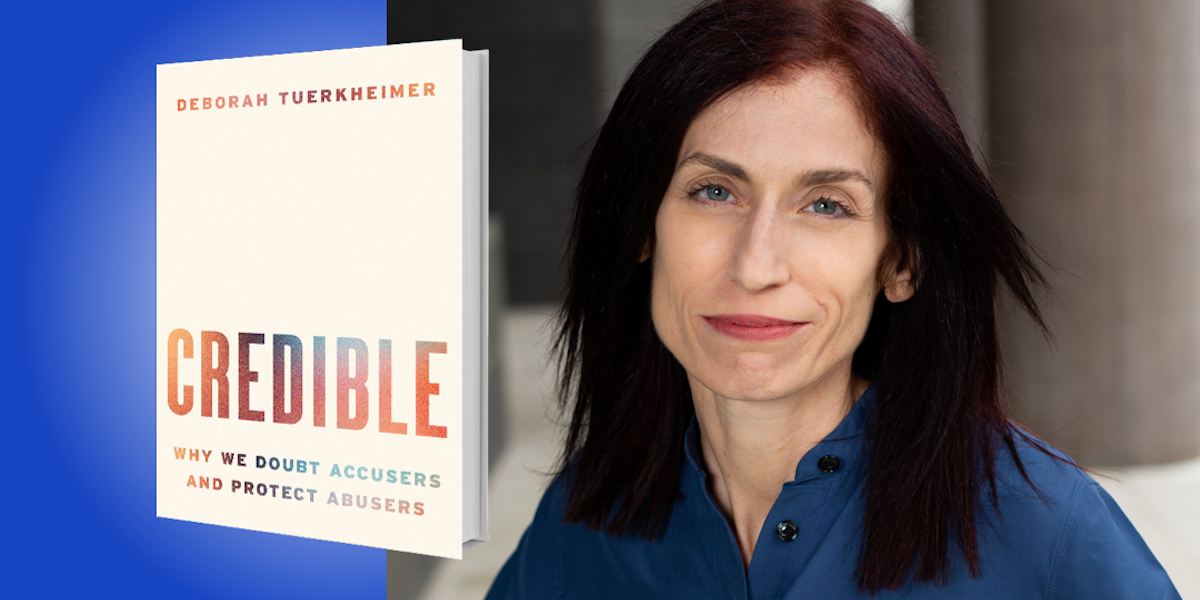Deborah Tuerkheimer is a former New York prosecutor, and is now a law professor at Northwestern University. Her new book draws on decades of conversations with survivors. Turkheimer has spent her career helping victims, investigating and trying cases, and speaking and writing about sexual assault and harassment to a range of audiences. She is convinced that our societal response to abuse can’t evolve until we shift our approach to judging credibility.
Below, Deborah shares 5 key insights from her new book, Credible: Why We Doubt Accusers and Protect Abusers. Listen to the audio version—read by Deborah herself—in the Next Big Idea App.
1. The credibility complex.
Judging credibility is a mighty power, because credibility is itself a form of power. As a society and as individuals, we wield this power in troubling ways—even the best-intentioned among us. This is because we’re all shaped by a cluster of forces that make us prone to discount the credibility of accusers while inflating the credibility of men accused. I call this cluster of forces the credibility complex.
Discounting credibility is everywhere. It’s not isolated or idiosyncratic—it’s patterned and predictable. It happens in the workplace, in medical settings, in salary negotiations, in the classroom, in intimate relationships, and on and on. But when a woman comes forward with an allegation of abuse, the widespread societal impulse to discount credibility is at its most intense.
Even without giving name to the credibility complex, most sexual misconduct accusers know it well. Many come forward only to be dismissed—perhaps because their account is disbelieved, but often because they are faulted for what happened, or because their abuse is treated with indifference. As a matter of course, accusers who disclose misconduct confront this credibility-discounting triad: distrust, blame, and disregard.
“Government researchers estimate that for every Black woman who reports her rape, at least fifteen Black women do not report theirs.”
Many, many more are silenced by the prospect of the discount. We know that most sexual assault is not reported through official channels. Among the population most vulnerable to rape, young women ages eighteen to twenty-four, less than a third complain to police. Women in college report at lower rates—20 percent, according to one recent estimate, and less than 5 percent, according to another. Reporting rates for women of color, both on and off campus, are even lower. Government researchers estimate that for every Black woman who reports her rape, at least fifteen Black women do not report theirs. This is how the credibility complex works, in advance, to keep allegations from surfacing.
When survivors do, against all odds, come forward, they are unlikely to see justice. Consider the statistics on sexual assault: Around the country, only around 20 percent of cases reported to the police lead to an arrest. In some jurisdictions, the arrest rate is much lower. Those allegations that do somehow make it to trial tend to be more vexing for jurors when the accuser and accused are acquainted—by far the most common kind of sexual violence. According to one estimate, which is based on aggregating various government data, out of every 1,000 sexual assaults, 975 perpetrators will walk free.
2. Our “untrustworthy woman” archetype.
The woman who lies about sexual abuse is a cultural mainstay. In the Bible, Potiphar’s wife accuses Joseph of rape after he rejects her advances, and this archetype has persisted across the ages. Many people would disavow this worldview. Nevertheless, all of us are shaped by a culture that casts sexual misconduct accusers as unreliable sources of information. We absorb the message that women can’t be trusted when they allege rape or harassment.
The ready availability of certain stock representations of lying women makes it easy for us to disbelieve. One figure who looms large is the gold digger. Within the legal system, plaintiffs of all kinds can be questioned about their financial interest in bringing suit, and lawyers who represent accusers in civil cases are well versed in this general line of attack. But sexual misconduct accusers are even more susceptible to such treatment. “The victim is viewed as someone who is basically just trying to make a fast buck,” as I was told by one experienced plaintiff’s lawyer from Philadelphia, adding that sexual harassment allegations are often seen as “just a money grab.” One example: At Bill Cosby’s retrial on sexual assault charges, after his first trial ended in a hung jury, Cosby’s lawyer said of the accuser, “What does she want from Bill Cosby? Money, money, and lots more money.” Outside the legal process, accusers are viewed in the same way.
“The confirmation bias causes us to search for evidence that confirms our preexisting beliefs, and then to interpret evidence in a manner that solidifies these beliefs.”
There are many other caricatures of lying accusers that distort our judgments. The woman scorned who seeks revenge on the man who rejected her. The regretful woman who rues consensual sex. The political tool who is willing to be used to advance a partisan agenda, or an agenda of her own. The attention seeker who craves the spotlight.
Then there’s the mistaken woman who is confusing what actually happened. She’s viewed as lacking the competence to discern, recall, and make sense of facts about her life. An accuser who is cast as mistaken or lying (or both, however illogical) is of course unbelievable. Regardless of why she’s considered untrustworthy, her accusation will be dismissed.
Whenever this happens, we’re likely to become even more skeptical of future allegations that come our way. The confirmation bias causes us to search for evidence that confirms our preexisting beliefs, and then to interpret evidence in a manner that solidifies these beliefs. Once we’ve witnessed the dismissal of an allegation, or we’ve dismissed it ourselves, the confirmation bias contorts our credibility judgments about all subsequent allegations.
3. The care gap.
Our care is distributed unevenly and predictably. Over and over again, we see that the suffering of an abuser who could face accountability for his misdeeds matters far more than the suffering of his victim. This disparity between inadequate regard for survivors and excessive regard for offenders is the care gap. Care is distributed along lines of power. Marginalized women are readily dismissed, and for men, power and influence buffer against allegations of misconduct.
Our cultural tendency to dismiss allegations of abuse aligns with the very human impulse not to intervene. This preference for circumstances to remain the same is referred to in the field of behavioral economics as the status quo bias. Psychologist Daniel Kahneman explains that we are intensely motivated to defend the current state of affairs. This bias, also known as loss aversion, is a “powerful conservative force that favors minimal changes from the status quo,” Kahneman writes. Research has mostly focused on financial decision-making, but it clearly has broader import. The studies tell us that we are pushed toward decisions that settle rather than destabilize.
“Care is distributed along lines of power. Marginalized women are readily dismissed, and for men, power and influence buffer against allegations of misconduct.”
A similar insight comes from the field of psychology. “All the perpetrator asks is that the bystander do nothing,” says the psychiatrist Judith Lewis Herman. “He appeals to the universal desire to see, hear, and speak no evil. The victim, on the contrary, asks the bystander to share the burden of pain.” A credible accusation of sexual assault or harassment is profoundly unsettling. Herman observes that, by coming forward, “the victim demands action, engagement, and remembering.” If we reframe what was done to her as unworthy of consequence, we can avoid the disequilibrium that would follow if we choose to care.
4. The aftermath can be even worse than the abuse.
Many survivors refer to the aftermath of abuse as a “second rape” or “secondary victimization.” Accusers who come forward only to be dismissed often describe fallout that is every bit as bad as—or worse than—the abuse itself. I’ve heard this from women who were distrusted, blamed, or disregarded. Regardless of why their report was cast aside, the credibility discount exacts an enormous toll.
Whenever an accuser trusts us with her allegation, she puts herself in a vulnerable position. Our credibility judgments can validate and empower the survivor, or inflict lasting damage. Research consistently shows that when victims receive negative reactions to their disclosures—including no reaction—they’re more likely to suffer a range of mental, physical, and emotional symptoms. “Betrayal, especially by a close and trusted person, can have far-reaching and damaging effects,” writes psychologist Jennifer Freyd, whose work on “betrayal trauma theory” helps explain why victims of sexual misconduct are often reinjured when they come forward to their loved ones.
In my conversations with accusers, most have mentioned that they were not only hurt, but surprised by the reaction of someone in their inner circle. These women expected more from those they trusted. This is consistent with research finding that the “strength of victims’ support networks,” including friends, family, and romantic partners, was a poor predictor of whether accusers would receive negative reactions to their disclosure. So many women I’ve spoken with underscored that their loved ones were good people; the pain inflicted was surely unwitting.
Most accusers described a kind of soft dismissal; distrust was couched in benign terms, with the allegation framed as a mistake rather than a lie. Blame was subtle, pitched as supposedly helpful questions about what might have been done to prevent the abuse. Disregard was translated into advice, perhaps to “forget about what happened,” or to “move on,” all in an effort to proceed without further rocking the boat. This unwillingness to disrupt the status quo was interpreted by victims as a measure of their worth. Precisely because the discounter was a trusted family member or friend, the measure had added significance.
“Most accusers described a kind of soft dismissal; distrust was couched in benign terms, with the allegation framed as a mistake rather than a lie.”
5. Each one of us is part of the solution.
If we want to see real change, we must dismantle the credibility complex. That can only happen if we remake law and culture so that trust, blame, and care are no longer meted out along axes of power. Our everyday interactions are a perfect starting point, because we know that most survivors of sexual assault and harassment will first report to someone within their orbit. The psychologist Kimberly Lonsway calls the moment of first disclosure a “fork in the road,” since those within a trusted inner circle will shape the aftermath of abuse for the survivor. We are these people, and we must do better.
We can improve our process of reasoning about allegations and denials by discarding the myths that surround victims and abusers. These myths maintain their hold only because we don’t see their influence. Once we do, their influence dissipates, opening space for science, psychology, and accurate understandings of abuse and the hierarchies that enable it.
Also, we can resist the lure of blame-shifting when women behave in ways that we know are most likely to trigger judgment: when women drink, when their dress and conduct is too “sexual,” when women don’t scream loud enough, fight hard enough, flee fast enough, when women don’t sever all ties with the abuser. And we can recognize our longstanding reluctance to hold men responsible for their misconduct.
And lastly, we can shrink the care gap. Many of the women I’ve spoken with asked very little of the friends and family members to whom they disclosed. Yet their loved ones managed to disappoint. One accuser told me that all she hoped for was an “I hear you, I believe you, and I’m here to support you in any way you ask.” Perhaps she would have wanted someone to share the emotional burden. Maybe she would have appreciated company if she chose to report to the police. She might have wanted her friends to cut ties with her abuser. Perhaps just knowing these measures were on offer would have helped. Whatever form it took, the support of her family and friends would have shown that they understood her abuse was wrong and that it harmed her. It would have demonstrated she was important to them. This alone would have made all the difference in the world.
To listen to the audio version read by author Deborah Tuerkheimer, download the Next Big Idea App today:































